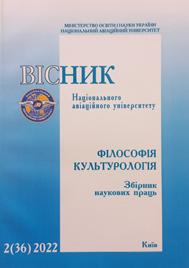CULTURE AS THE MENTAL SPACE OF CIVILIZATION
DOI:
https://doi.org/10.18372/2412-2157.36.16983Keywords:
dialogue, spirituality, globalization, communication, culture, mentality, spiritual values, civilizationAbstract
Introduction. In modern humanitarian thought, the thesis is traced and supported that the fundamental values of history are being
formed rather by invariants of historical activity, having preserved in the body and spirit of culture than changes in the socio-economic
progress. The aim and tasks of the study are to analyze the connection between the civilizational processes of the modern global world
and culture, their interdependence, specific features inherent in modern civilization and culture, trends, ways, and place of culture in the
process of overcoming the anthropological crisis of modernity; to reveal the role of intercultural dialogue in the system of modern
civilizational processes. The theoretical basis of the study was the work of Ukrainian and foreign researchers devoted to the problems of
culture and civilization in the field of philosophy of culture, cultural studies, sociology, and psychology. Dialectical, systemic,
interdisciplinary, and comparative research methods were used. Research results. As a result of clarifying the content of the concepts
of "civilization", "culture", and "mentality", the dichotomy "civilization - culture" is considered in the study as two dialectically conditioned
sides of the socio-historical process. One of them ‒ civilization ‒ represents the social organization of the social life of individuals, the
integrity of their world based on the reproduction of social wealth, which allows and ensures their existence and development. The other
side, culture, represents the existential experience inherent in civilization, invariant structures, and enduring universal human values.
Discussion. Culture, on the one hand, is determined by the needs of the social practice of a particular stage in the development of
civilization, which is expressed in the form of public interests, and on the other hand, culture is characterized by relative independence,
internal sources of self-development and functioning mechanisms. Conclusion. As a result of understanding and discussing the topic,
the author comes to the conclusion that culture provides a semantic field for the interaction of different spheres of activity, when
knowledge, norms, methods, techniques, rules, and values from one form of culture pass into others, are rethought there and stimulate
the development of their content. Culture creates the semantic space of civilization, its "force field", which can be called mental.
References
Бойченко І. Цивілізація. Філософський енциклопедичний словник. Київ : Абрис, 2002. 850 с.
Бойченко І., Хамітов Н. Культура. Філософський енциклопедичний словник / редкол.: В. І. Шинкарук (голова) та ін. Київ : Абрис, 2002. 850 с.
Гусейнов А.А. Лекторський В.О. Єдність світу і розмаїття культур. Матеріали круглого столу. Філософська думка. 2011.№4.С.5-24
Дротянко Л. Г. Інформаційний простір і діалог культур в інтер’єрі XXI століття. Вісник Національного авіаційного університету. 2011. Вип. 1 (13). С. 5-8. (Серія «Філософія. Культурологія»).
Йолон П. Ф. Обриси ментальності та її суб’єкта. Проблеми теорії ментальності / від. ред. М. В. Попович. Київ : Наукова думка, 2006. С. 372‒403
Кримський С., Заблоцький В. Ментальність. Філософський енциклопедичний словник / редкол.: В. І. Шинкарук (голова) та ін.
Київ : Абрис, 2002. 850 с.
Кримський С. Б. Запити філософських смислів. Київ : Парапан, 2003.
Кримський С. Б. Про софійність, правду, смисли людського буття. Зб. наук.-публ. і філос. ст. Київ : 2010. 464 с.
Матюхіна О. А. Комунікативний простір української культури кінця XIХ-початку ХХ століття як фактор розвитку національної свідомості. Вісник Національного авіаційного університету. 2021. Вип. 1 (33). С. 122-126. (Серія «Філософія. Культурологія»).
Мокляк Л. І. Соціокультурні функції естетичної культури в умовах трансформації сучасного українського суспільства. Вісник Національного авіаційного університету. 2012. Вип. 2 (16). С. 96-100. (Серія «Філософія. Культурологія»).

